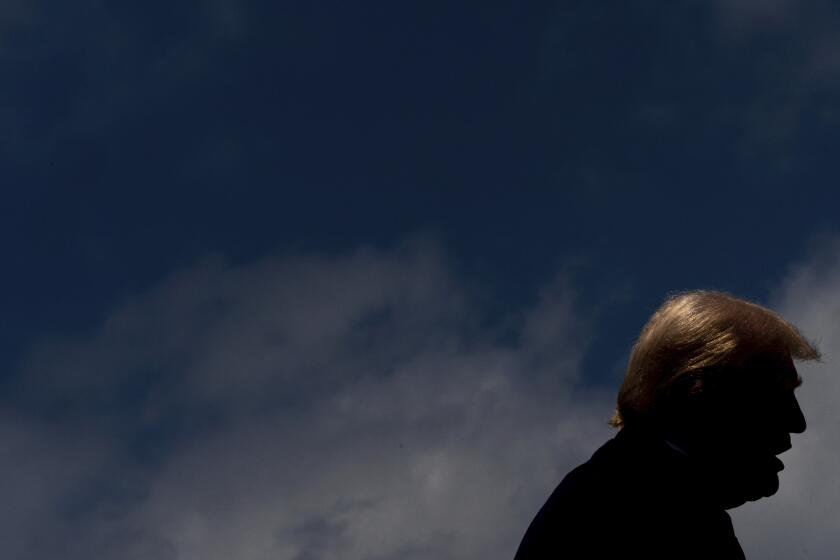More bombs bursting in Libya. What for?
Wait a minute. How did this happen? A month or so ago, massive bombing of Libya was on no one’s agenda. Libya’s government was just as tyrannical and its leader was just as loony then as now. Other governments around the world were even worse, and still are. In fact, among the usual enthusiasts for this sort of thing, Libya was considered one of the least urgent cases of awfulocracy because we had supposedly de-fanged Col. Moammar Kadafi in 2003, when he suddenly surprised everyone by promising to dismantle his secret nuclear program, permit inspections and abide by the terms of the Nuclear Nonproliferation Treaty.
Kadafi was like a Middle Eastern Fidel Castro — dead. We were just waiting for him to lie down. What’s more, credit for this tremendous victory was assigned to George W. Bush as a bonus side effect of his decision to invade Iraq and take down Saddam Hussein. This put the fear of Allah in the mercurial colonel. Or so they said. But apparently not. Somehow, Moammar got his mojo back.
So how is it that the United States is now more or less committed to overthrowing the Kadafi regime, and soon? That’s not yet our official position, of course. Officially, we are merely enforcing a no-fly zone imposed by the United Nations, and trying to protect a dissident movement from being crushed.
What’s more, we are supposedly mere participants in a multilateral effort. Supposedly, in fact, we’re not even the leader of this coalition, a role we have turned over to the British and French. (You knew the war was serious when the New York Times started to refer to our side in headlines as “the allies.”) It’s true that France jumped the queue rather than waiting its turn to bomb like all the other, better-behaved countries (even while delaying the official start by summoning all the players to Paris over the weekend). But that doesn’t make them the leaders. That just makes them French.
As for that U.N. resolution, it’s more a matter of “Let’s you and him fight.” The U.S. will be expected to do the heavy lifting. And if the U.S. had been opposed, it would not be happening. If Kadafi is still in power a year from now, even if he is obeying the no-fly rules, it will be regarded worldwide as more evidence of America’s decline as a great power and regarded in America as evidence that Democrats in general and Obama and Hillary Rodham Clinton in particular are not ready to play foreign policy with the big children.
On a more high-minded level, Obama would like to demonstrate that sharing the burden, including the burden of leadership, with coalition partners is a better way to go about this sort of thing. But one way or another, he’s in it now, and so are we. And when he says that compromise is unacceptable, there’s every reason to believe he means it.
So once again the bombs are bursting on CNN. But why? We’re getting terribly familiar with this routine, and even complacent about it. Obama wasn’t even in this country when the bombing started.
Obviously, things are changing in the Middle East. As everyone says, the democratic revolt that is sweeping the region is our opportunity to get on “the right side of history” for once.
But how sure are you that the protesters for democracy (if that is in fact what they are protesting for) will credit the United States with helping their cause, rather than blaming us for raining bombs on yet another Arab country? Inevitably, there will be — probably already is — “collateral damage” (a mosque built too close to a fuel storage facility, or an orphanage hit by accident when U.S. intelligence mistakes it for a military training camp). We will be forced to plead that “accidents can happen,” which is true and a good excuse in the middle of a war.
But it’s not a good excuse before the war starts. In 1986, Kadafi scored a propaganda victory when U.S. bombs on Tripoli killed a little girl he claimed was his adopted daughter. (True, Kadafi is fairly loose in his definition of offspring. In a letter to Obama on Sunday, he repeatedly referred to the president as “our son.” Although he might just have been goading the “birthers.”)
The elder Brahmins of the region, represented by the Arab League, are sending decidedly mixed signals as always. No doubt they could live very happily without Kadafi. But they don’t care for revolution of either the democratic or theocratic kind, and seem a bit uncomfortable joining in a coalition with the U.S. to violate the sovereignty of yet another Arab country.
Meanwhile, they are doing very nicely on the wrong side of history, with oil up above $100 a barrel. In the annals of ingratitude, there is nothing like it. Saudi Arabia and Kuwait have broken every promise they made before the Persian Gulf War about moving to democracy when it was over.
Was there nothing we could have done between sitting on our hands and launching something close to all-out war? Sure there was. We could’ve done what we did for Eastern Europe, which helped bring victory in the Cold War: verbal support and financial support for dissidents and democrats. Make clear which side we’re on, but without overpromising. It sounds like the opposite of “Speak softly and carry a big stick,” and in a way, it is. But it worked to defeat communism, and our track record with bigger ambitions in smaller situations has not been impressive.
Michael Kinsley, a former editorial page editor of The Times, writes a column for Politico. A version of this column also appears on that website.
More to Read
A cure for the common opinion
Get thought-provoking perspectives with our weekly newsletter.
You may occasionally receive promotional content from the Los Angeles Times.










